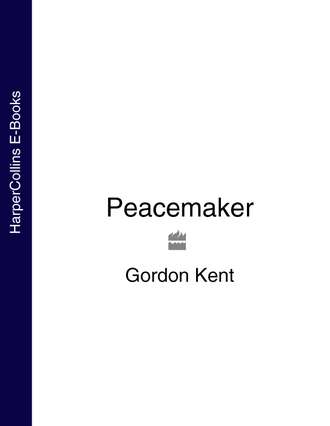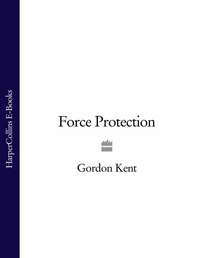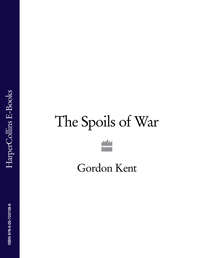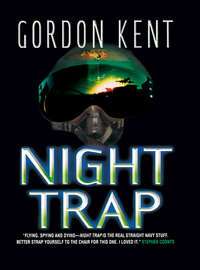
Полная версия
Peacemaker
Would they?
Near Nice, France.
The man called Zulu was riding in the back seat of a chauffeured Daimler and enjoying it. He liked the idea that other people envied him without knowing who he was, some wealthy man made invisible by tinted glass. He was a little wound-up, not bad, nothing like before a fight or the other—a couple of black pills, pulling him up, then a silver to smooth him out. A civilian dose. He touched his sunglasses, which were very dark and very sleek, wrapped back around his temples like the windows of a jet (Bolle, expensive) and a further step toward invisibility. No, toward disguise. This made him smile, too. Zulu was forty and looked younger. A lot tougher than most men of forty. The disfigured nose was a badge of honor, and some women loved it.
The car purred through electronically operated gates that closed behind it, and it swung right and then curved widely left up a semi-circular drive. A man with a rake and a man with a two-way radio watched it; the man with the rake went back to work on a flowerbed, and the man with the radio murmured something and looked intensely serious.
Lascelles was waiting on a terrace. Lascelles was old, old enough that his face had started to show cross-furrows between other furrows, like the cracks in dried mud where a lake had once been. Lascelles had been a colonel, a mayor, a minister, and the real but invisible head of France’s security apparatus. Until he had been forced out. Now he was an angry old man. Not to be underestimated, however. A dangerous, angry old man.
Zulu got out of the big car quickly, his hands just touching the front of his trousers as if he expected the edges of the door to be dirty, swinging his hips out as a woman does, sliding. Erect, he touched the sunglasses and checked his inner self. Was he just a little too high? No, just right. Not nervous. Zulu had not been nervous since he had got big enough not to fear his father’s belt.
“You like the Daimler?” Lascelles said, shaking hands. Meaning nothing.
“Very nice.”
“You picked a pleasant day.” Lascelles’s eyes flicked over the almost fresh cuts on Zulu’s face, then flicked to his hands. Lascelles missed little. “Yesterday, we had rain. Cold!” Lascelles led him along the terrace, making these human sounds, although neither man was very human, smiling a little smile, as if it amused him to be leading this creature, this thing, this gorille manqué along his terrace. He had used all those terms to talk about the man they called Zulu. Not that he wasn’t something of a creature himself.
“Everything is working all right?”
Zulu used silence for his answer. If everything was not all right, he would speak.
They went in through a door to a big, pleasant room full of soft colors like those on the terrace, fabrics with a sheen, a couple of good but unassertive oil paintings. The room did not smell quite right. “I have a task for you,” Lascelles said once they were inside, as if in there it was safe to get serious.
“I need some things, too.” Zulu reached into his jacket, took out a folded paper and handed over a computer-printed list of weapons.
“Well—” Lascelles sat, motioned toward an armchair. “Tit for tat. I have something I want you to do, fairly big.” His face furrowed still more deeply. His head was round, bald, mottled brown. It drew back into his collar.
“My plate is full at home.”
“Nonsense. They have this ‘peace accord,’ NATO have drawn a wavy line on the ground, you are all at peace.” He laughed. “The Americans are putting their nose into something and I need to slice the end off. That will not offend your sensibilities, I think?”
“You know what I think of them.”
“Exactly.” Lascelles went off on a rant that Zulu had heard before, on and on—moral decay, the Jews, Brussels, NATO, the UN. Etcetera, etcetera, etcetera, Zulu said to himself, his thoughts invisible behind his tinted glasses, although he had his own reasons for hating NATO and the UN.
“I am an exile in my own country,” Lascelles was saying. “I! An honorable exile! A patriot!” His face was red. Like all the French of a certain kind, the ghost of Napoleon always hovered close by him. “The current government of France is deeply unpatriotic, completely subverted by the world state!”
“What do you want me to do?” Zulu said, letting his impatience show.
“Africa,” Lascelles said.
“Africa, oh, shit—Not again!”
Lascelles leaned forward. “The UN patched together some of their internationalist crap and stopped the Rwandan genocide before a satisfactory conclusion was reached. That’s how they work, to put their army in place. Now they are setting up subversion centers all over that part of Africa. The Americans have satellites up above there, too. Hand in glove. But central Africa is French territory. It has always been French territory. One cannot be soft about such matters. One must be hard. Whatever one’s humanitarian feelings, one must be hard. For the greater good.”
“Absolutely.”
“The UN and the Americans must be driven out of central Africa. I will put Africa back together later, after the threat is finished. They will welcome me, you will see. I—we—have old friends there, old clients, I need only speak a word—” His eyes narrowed. “Mobutu!” he whispered. “Very powerful. Very rich. Absolutely my client.”
“Oh, God, Africa.” Zulu rolled his head on the back of the couch. One day in and out, shooting down that airliner, that had been all right. Once in a way, it was all right. Still, he needed weapons. And his war in Bosnia was on hold. “NATO-compatible weapons this time. No old Russian stuff, Lascelles.”
“Yes, yes, yes—!” Lascelles waved the list. “I don’t do these things myself.” He sounded whiny, at the same time arrogant. I give it to some underling, he meant. Arms dealing was a detail, he meant. “You will get your weapons.”
“Soon, it has to be soon, or no deal. To go to Africa, you know—”
Lascelles’s eyes looked shrewd. Like a child saying a naughty word, he said, “One of your centers in the Serbian zone got knocked over, I heard, is that what I heard?” His eyes flicked over Zulu’s face and hands again. “You were there?”
Zulu made a face. “A little one, nothing.” It definitely had been more than nothing, but he wouldn’t admit it to this old spider; it had outraged him, some bunch of shitkickers from UNPROFOR driving him out of one of his own places. Forcing him to jump through a fucking window with some American shithead shooting at him! The amphetamines pushed his anger up and he almost let it show, but he brought himself down, stayed quiet. Pretended to deal with it. “Pustarla, big deal—! The fucking UN!” He flexed his right knee and felt the pain of the long gash he had got, jumping through that window.
“Internationalism!” Lascelles cried. “You see? You see? It’s all part of their plan!”
Zulu didn’t in fact see. He didn’t care a dog’s fart about internationalism. He believed that Greater Serbia could exist in and of itself, separate from the world, above the world. When they had exterminated the Muslims, when the Croats were subdued, when Greater Serbia was a clean and pure state, then they would close their borders and be themselves. To hell with the UN and the US, was his view. To hell with Europe. And fuck France. But, just now, he needed Lascelles.
“What do I have to do in Africa?” Zulu said.
“For now, go back to Serbia and select good men. Say two companies. Elite. Then I will need to send you down there to start things, and if it really explodes, I will need you and your men there perhaps for a month. White troops go through Africans like a hot knife.”
“Money?” Zulu said shrewdly. “White men get good money to fight in Africa.”
Lascelles’s furrows folded in on themselves a little, as if he were pulling into himself. This was his version of a smile. “France will be fair.”
He meant that he would be fair, but he thought of himself as France.
He put his head back, closed his eyes. The meeting was over.
Zulu waited a few seconds to show that he couldn’t be dismissed like a flunkey, but Lascelles ignored him, and he got up and put on his sunglasses and went out to the terrace. As soon as he got out there, the air was sweeter. The odd smell inside was Lascelles.
Zulu went down the terrace, thinking about his war and the loss of the place in Pustarla. Him, the commander, being forced to go out a window and run through the snow like a naked girl. Some goddamned American shooting at him—he’d heard the voice, knew that accent all too well. Rage surged up again and he let it go this time. Rage was good for him, he believed, a rush like a drug. He could do a lot on rage. Africa. For a little while, maybe, while things were quiet back home, until the “peace accord” fell apart. But he had to stay focused. Not get sidetracked by Lascelles’s adventures in Africa. A means to an end. There was no rage for him in Africa. The American who forced him out that window. Yes, he felt rage about that. Greater Serbia. Yes, there was rage. The fucking Muslims, the goddam Croats. Lice. Vermin. Things. Rage. Rage.
The Med, aboard USS Jefferson.
Alan had Ensign Baronik working on the squadron IOs brief, the intel specialists prepping the visuals, and his senior chief cruising the ASW spaces in case there was any chance of running anything against a real target. He felt a pang of envy for the guys who would do it if he found anything. Alan had been a pretty good back seat not so long ago, and he’d run a line on a Russian sub that had almost got his S-3B goosed with the periscope when it had surfaced. Great days. Great for a young man, anyway. Now, he was a senior lieutenant, about to become an acting CAG AI, in—he checked his watch—six hours and thirty-nine minutes.
Because LCDR Suter was leaving.
Leaving his IO’s post, leaving the ship, leaving the Navy. To take “something better,” he’d said with that sneer-smile he used, as if the something better was really better, and none of you merely mortal shmucks would understand how much better. Resigning usually took six months to a year.
Alan’s guess was that Suter had had a greatly accelerated resignation because somebody out there, somebody with real clout, wanted him enough to twist arms.
The raid on the torture center in the Serbian zone seemed like a distant memory now, except for flashes of the man he had shot and of that shadow on the wall—the witch. Or gargoyle. Or whatever that had been. And the name Zulu, which had been on the photograph and which the men who had been tortured there had spoken with fear.
He had got some medals out of it, for what that was worth—one from the Italians that said Coraggio e onore, and a letter from the Canadians, commending him for “extraordinary efforts in intelligence support and acquisition.” The Kenyans had been downright embarrassing (“glorious achievements to enhance our medical work under the banner of the United Nations”).
Had he done well? Had it meant anything, that dawn raid? Men had died; he had killed—what had it accomplished? They had saved two men from more torture, he supposed. One of the victims they’d brought out had had a fractured sinus, wa Danio had said, a broken nose and broken teeth, three broken ribs where they had kicked the water out of him. One had died. One of the bodies had had both eyelids cut away. And for what? Nobody seemed to know. For being young and Muslim. When he thought of the man who had had his eyelids cut off, Alan thought, How can a human being do that? and then he felt a revulsion and anger that gave the Bosnian raid a bad taste.
He had tried to write to a friend who was a Navy cop, Mike Dukas, about it. What kind of people do these things? Maybe a cop would understand. Mike, it’s you guys they need there, not me. They need law. Was that what peacekeeping was?
Now, back on the boat, Alan was going down the list of classified pubs for which Suter was responsible, because Suter was leaving and had to sign off on the classified pubs in his care. The list had already been done and checked by Suter himself, but Alan knew that Suter would screw him somehow if he could. So on and on he went, Alan sinking lower and lower in his chair, until, as he had feared, he found two titles that had been checked off by Suter but that in fact couldn’t be found. Alan wrote a memo and put it in the folder, and then he indicated the missing two as unaccounted for on Suter’s sign-over receipt, initialed the two, signed “with exceptions as noted,” and sent the pages off to Suter. Another stack arrived shortly after.
Suter put his head in at 1717. “I’m out of here in a half-hour.”
Alan went on signing.
“I hear you found two docs missing.”
“Yes, sir.”
“They were there this morning when I did them.”
“They’re not there now.”
“You know they’ll turn up.”
“Yep.” He went on signing. “I’m sure that right now they’re under somebody’s rack, and when we do a final fore-and-aft sweep before hitting the beach, they’ll come out on the end of a broom and we’ll get them back.” Scrawl, flap.
“Why not just sign off for them now, then?”
“Because they’re not in my possession, and that’s what I have to sign for.” He looked up, grinned. “It’s the law.”
“You know, Craik, you’re the most arrogant cocksucker I’ve ever had to serve with.” He sounded almost genial.
Alan finished signing and pushed the orders across the desk. Later, he would wish he had thought to say, Clearly, I don’t have your experience with cocksuckers, but he didn’t. “You’ll miss your flight if you don’t hurry, sir,” is what he said.
Suter stared into his face, Alan into his. Finally, Suter uncrossed his arms, picked up the orders, and straightened. “Jesus, I’m glad I’m leaving the Navy,” he said. He started out. “I hope you fall on your ass trying to do my job, Craik.”
Alan stopped by the mail slots and found a letter from his wife, which he read in the quiet of the maintenance office, with Senior Chief Prue thoughtfully giving him some space. Everything was good at home—Mikey was growing like a weed; the dog had eaten part of a sweater Rose’s mother had knitted specially; Rose thought she had a line on a great posting for her next tour, some project called Peacemaker. He headed for a briefing with a grin on his face.
Near Atlanta, Georgia.
Mike Dukas was thoroughly pissed. He had just taken part in a bust that was supposed to be a big coup for the FBI and his own agency, the Naval Criminal Investigative Service, and all they had got was an empty house, five hours of tedium, and a U-Haul full of computers and computer disks. Never mind that the disks were loaded with pornography; nobody knew that yet, and, anyway, the porn wouldn’t have any significance to him for months.
And it was all Alan Craik’s fault. No, be honest; not Craik’s fault—his fault, his, Mike Dukas’s. It was the frayed end of an old operation that had started with Al Craik years before, and Dukas couldn’t let go of it. In part because he was nuts about Craik’s wife. And thought of Craik himself as a very, very close friend.
Oh shit. Dukas felt lousy. A day wasted, and for what?
He sat in his rental car and thought about driving to the airport and waiting for the plane and flying back to DC and having nothing to report. What was he accomplishing, anyway? And what waited for him at home—three AWOL sailors, five domestic disputes, two incidents of racial hatred? This was what a Navy cop did?
So he took from his pocket a letter he had just got from Craik and read it over again, and he was envious. It was all about some raid Craik had been on in Bosnia, shooting and everything. Helos! Grenades! Prisoners! And what the hell was Dukas doing? Sitting on his ass in a rental car and mooning over a busted operation.
And a line that went right to the heart. Mike, it’s you guys they need there, not me. They need law.
It was like an order from a friend: Get involved.
But how?
Well, he was a cop—a Navy cop, sure, but a cop. They must need good cops in Bosnia. They must have criminals. War criminals. Hey, there was an idea. Catching war criminals—what could be a more honorable duty for a cop than that?
War criminals. Now, who was hiring cops to go after war criminals?
He started the car. The UN. No, it wasn’t the UN who went after war criminals; it was the World Court. Somebody he knew must know somebody over there. Somebody—
Langley, Virginia.
At CIA headquarters, a man who disliked Alan Craik as fiercely as Dukas and O’Neill liked him was, for a moment, thinking about Alan. His mind flicked over the subject of the young naval officer on its way somewhere else—flicked, felt distaste, moved on. Alan Craik was one of his failures: he’d tried to recruit Craik, had told him only a little lie, and Craik had gone all moral on him and humiliated him. The little shit.
George Shreed leaned on his stainless steel canes, looking down from the window of his new corner office and, after touching Craik as you’d touch a sore spot and flinching away, thinking that it was time to do something big. Something really big. A riiiillly big shew, as that asshole used to say on television.
He had been kicked upstairs. Downstairs, his former assistant had his old job. She had betrayed him, too, and now she had his old job, which she was already making a mess of. Good. He must see to it that she really made a mess of it.
In the meantime, he was going to launch something big.
A light flashed on his desk; he hobbled to it and hit a button and a woman’s voice said, “Lieutenant-Commander Suter is here.”
“Send him in.”
He waited, standing behind his desk, his weight on the canes. He had a handsome face made haggard by constant pain, a long body with big shoulders from heaving it around on his hands. He had probably risen as high in the Central Intelligence Agency now as he ever would, and he knew it, and he was going to start having his fun.
The door opened. Suter paused in the doorway.
Shreed smiled. “Come on in.” He propped the canes against his desk and swung himself into the armchair. “I was going to call you, anyway. You settling in?”
“I know the route from my car to my office, anyway.”
“I have a task for you,” Shreed said. “You ready?”
Suter bobbed his head, cocking an eyebrow; it was a kind of acknowledgment or recognition.
Shreed took his time in settling himself at his desk. He leaned the steel canes against a spot that had held them so often it was worn. “I took you on,” Shreed said, “because I figured you’re my kind of bastard. Isn’t that what you figure?”
The faintest of smiles touched Suter’s face. “We seem to have a kind of meeting of the minds, yes.”
“You’re getting a late start here. I’ve pulled you in above a lot of other people who therefore hate your guts. Hate is good for a career. You just have to keep ahead of it. You’re used to being hated, I’m sure. Where did you get that suit?”
Suter was wearing a dark-blue rag that had nothing to recommend it except the crease in the trousers. He reddened and named a department store.
“It looks it. Anyway, I’m sending you someplace else—a place called the Interservice Virtual Intelligence Center.” He grinned. “I’ve made a deal with the devil. You’re going to see he keeps his part of the bargain. That may be just the suit for the devil.” He waved a hand. “Sit, sit; this is going to take a while. What do you know about a project called Peacemaker?”
Atlantic Fleet Headquarters, Norfolk.
“Project Peacemaker!”
In Conference Room B of LantFleet HQ, Alan Craik’s old squadron-mate LCDR “Rafe” Rafehausen was having a briefing. The briefing was part of a larger planning conference for Battle Group Seven, now in its formative stages as it prepared to join Sixth Fleet late that year. Consisting of the CV Andrew Jackson, a Tico-class missile cruiser, and associated destroyers, subs, and support ships, it would carry the flag of Admiral Rudolph Newman aboard the Jackson with Air Wing Five. For Rafe Rafehausen, this would be a make-or-break cruise: he was to join VS-49 as XO only three months before the battle group put to sea, with the awesome certainty that if he did the job well he would become skipper of the squadron two years after he signed on. At the moment, he was sitting in on the planning conference as a guest of the current VS-49 skipper and exec.
The briefer was a captain. Everything about him said he was a hardnose. He was laying it out as if he had been up to the mountain and got the plans on stone. He summarized: “And so this cruise will have two primary responsibilities—Project Peacemaker, in Libya’s Gulf of Sidra in December, and the ongoing support of blockade and air ops in the former Yugoslavia.
“Project Peacemaker will require that we secure the Gulf of Sidra for the Peacemaker launch vessel. This will be a major undertaking involving air and surface elements within fifteen miles of the Libyan coast. We will do a complete, repeat, complete fleet exercise that will mock up the entire operation. Fleetex is currently scheduled for October of this year. That is six-plus months to prepare for units that at this time are not in a high state of readiness!” He glared around the room. Full commanders avoided his hard eyes; lieutenant-commanders blanched. It was no secret that the fleet was below full manpower and that training was behind.
The captain held up a fist, from which an index finger pointed upward like a preacher’s. “Fleetex, Bermuda, October 96.” Another finger pointed. “To sea, November 96.” A third finger. “Peacemaker, Gulf of Sidra, December 96!” He glared. “Questions?” He said it like a man who dared anybody to ask a question.
A courageous commander murmured, “Is that date for Peacemaker firm?”
“Why wouldn’t it be firm?” the captain shouted.
A rash lieutenant, one of the few people in the room below lieutenant-commander, stood up, and Rafehausen groaned inwardly. The lieutenant said, “Bosnia and Peacemaker, that’s it, sir?”
“What else would you like?” the captain snarled.
“Uh—sir, Africa is ready to—” Rafehausen groaned silently again and thought Oh, Christ, another Al Craik!
The captain barked like an aroused Doberman. “Africa’s not even on my map! Bosnia and Peacemaker! Any other questions?”
Rafe had a question, but there was no point in asking it of this guy. It was a question that only Rafe himself could answer, anyway: How am I going to get an under-manned, inexperienced bunch of guys ready for sea in six lousy months? He looked at the man who would by then be his skipper. The guy had a reputation as a screamer and a morale-destroyer. My fucking A! Rafe thought.
Norfolk Naval Base.
“Peacemaker? The hell with it!”
Vice-Admiral Rudolph Newman was the flag commander of Battle Group Seven, which was beginning to take shape. “We’re going to do this right, for once,” he said. He sounded angry, as he always sounded, even when he wasn’t angry. “No Mickey Mouse!” he said.
“No, sir.” His flag intelligence officer was the hardnosed captain who had done the briefing where Rafe Rafehausen had sat in. With the admiral, however, he was sweet as honey. He had served with Newman twice before and knew what the man was like.
“Nothing we can do about this Peacemaker crap,” the admiral growled, “so we’ll have to do it. Keep something in the Fleetex script about it. You know how they scream if somebody’s pet project doesn’t get its due.”
“Yes, sir.”
“But I want a fleet exercise with guts. I want the men and officers who serve under me to know who the enemy is, and I want them to have this experience so they’ll be ready!”







